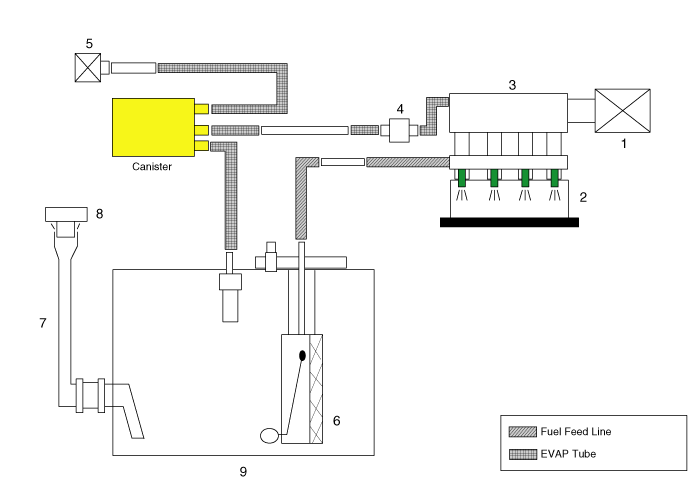Hyundai Elantra: Evaporative Emission Control System / Schematic diagrams
Hyundai Elantra (CN7) 2021-2025 Service Manual / Emission Control System / Evaporative Emission Control System / Schematic diagrams
| Schematic Diagram |

| 1. Air cleaner 2. Delivery pipe & injector 3. Engine 4. Purge control solenoid valve (PCSV) 5. Fuel tank air filter | 6. Fuel pump 7. Fuel filler neck 8. Fuel filler cap 9. Fuel tank |
Canister
Canister is filled with charcoal and absorbs evaporated vapor in fuel tank. The gathered fuel vapor in canister is drawn into the intake manifold by the ECM/PCM when appropriate conditions are set.
Purge Control Solenoid Valve (PCSV)
Purge Control Solenoid Valve (PCSV) is installed in the passage connecting canister and intake manifold. It is a duty type solenoid valve and is operated by ECM/PCM signal.
To draw the absorbed vapor into the intake manifold, the ECM/PCM will open the PCSV, otherwise the passage remains closed.
Fuel Filler Cap
A ratchet tightening device on the threaded fuel filler cap reduces the chances of incorrect installation, which would seal the fuel filler. After the gasket on the fuel filler cap and the fill neck flange contact each other, the ratchet produces a loud clicking noise indicating the seal has been set.
 Canister
Canister
Repair procedures
Removal1.Turn the ignition switch OFF and disconnect the negative (-) battery cable. 2.Disconnect the vent hose (A).3.Remove the fuel tank air filter (A) by rotating it 30 degrees...
Other information:
Hyundai Elantra (CN7) 2021-2025 Service Manual: Components and components location
Component Location1. Integrated body control unit (IBU)2. Rear glass defogger switch3. Rear glass defogger..
Hyundai Elantra (CN7) 2021-2025 Owner's Manual: Aluminum wheel maintenance
The aluminum wheels are coated with a clear protective finish. NOTICE Do not use abrasive cleaner, polishing compound, solvent, or wire brushes on aluminum wheels. Clean the wheel when it has cooled. Use only a mild soap or neutral detergent, and rinse thoroughly with water. Also, clean the wheels after driving on salted roads. Do not wash the wheels with highspeed car wash brush..
Copyright © 2025 www.helantra7.com


.png)
.png)